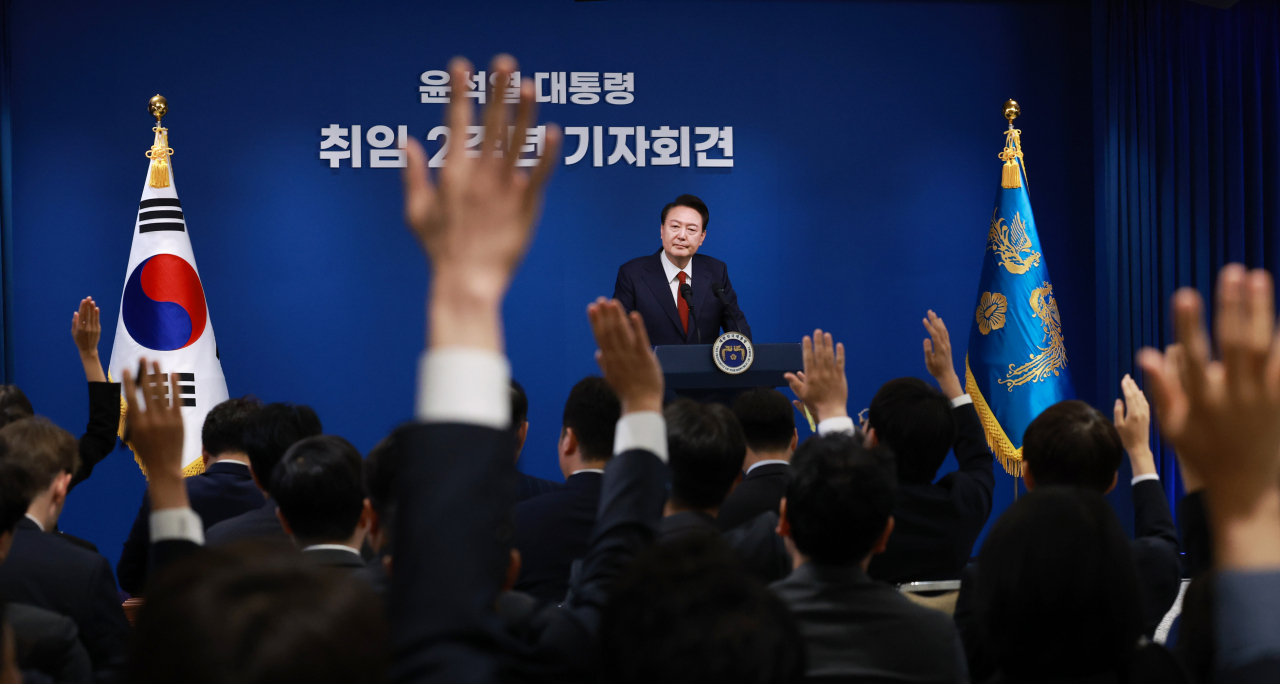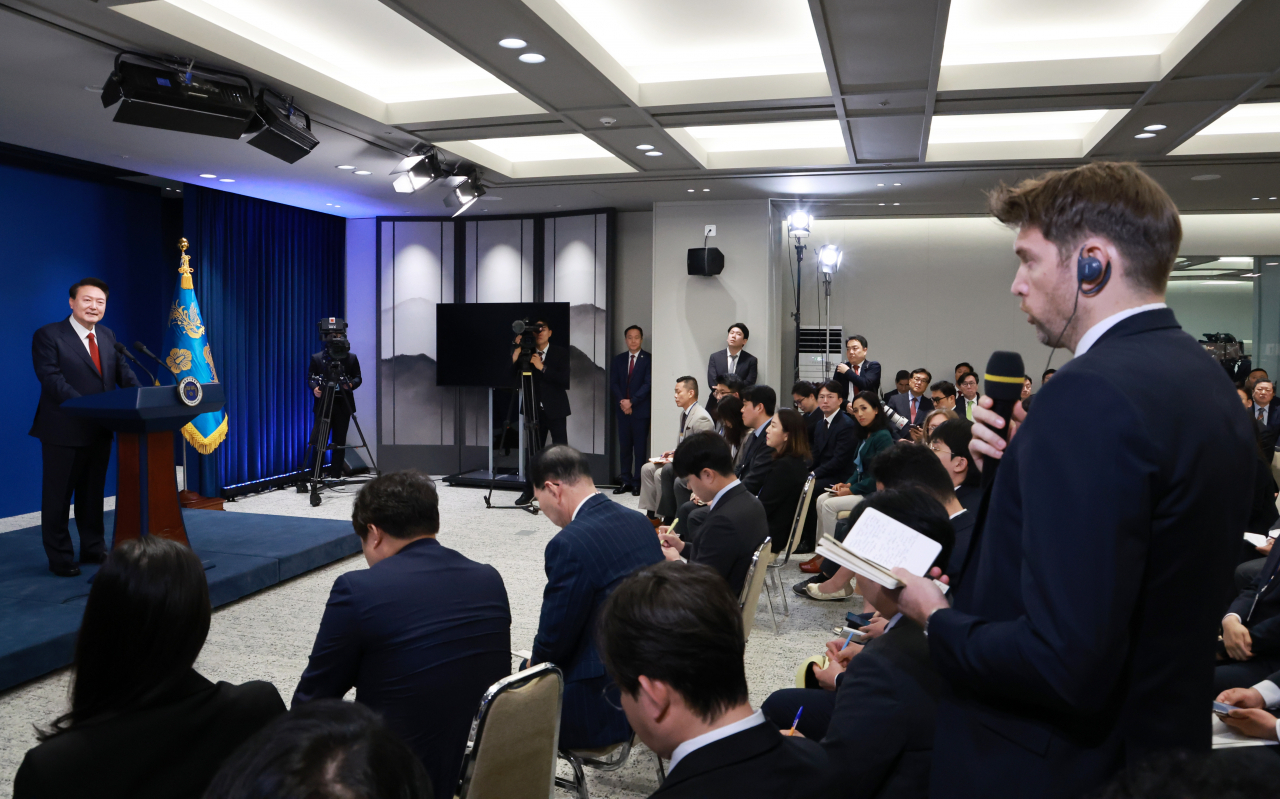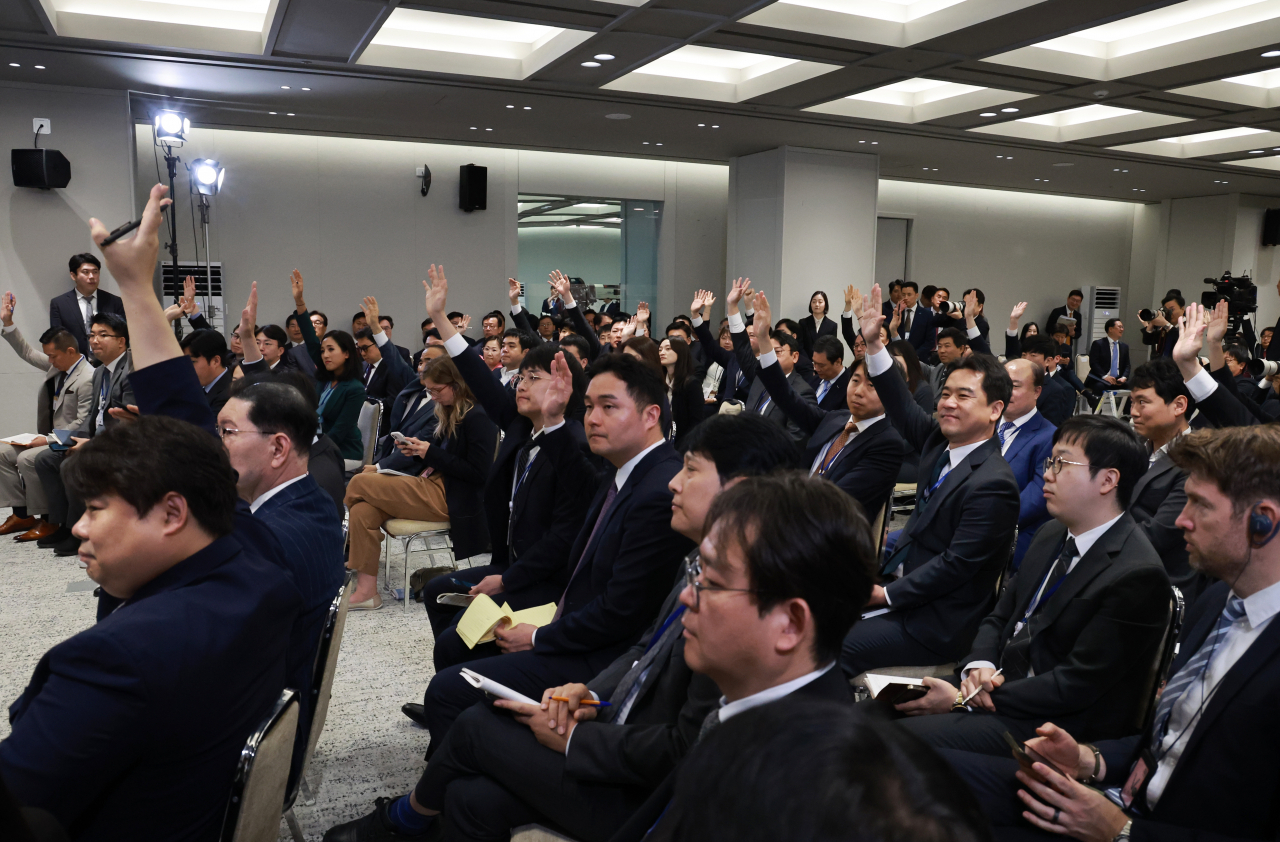[From the Scene] At 1st press conference in 631 days, Yoon seeks to mend media ties
By Son Ji-hyoungPublished : May 9, 2024 - 18:09

Just as President Yoon Suk Yeol entered the briefing room filled with some 150 reporters in his office in Seoul on Thursday, for the first time in 631 days, one of the reporters asked Yoon to hold more frequent news conferences and boost communication with the public.
"I will," Yoon replied.
After this, Yoon took 20 questions during the 73-minute press conference. The questions centered around politics, foreign policy, the economy and social affairs. He took more questions than he did in his first such conference in August 2022, when he answered 12 questions.
Then, Yoon also admitted his shortcomings in communicating with the public about his policy directions.
Critics have long accused Yoon of eroding press freedom in South Korea.
In the early stage of his term, Yoon promised to become a leader who "frequently stands in front of reporters and takes reporters' questions," which he said in the first press conference held to mark his 100th day in office. He also held regular "door-stepping" sessions to take questions from reporters on his way to the office.
It was Yoon's hot-mic incident during his visit to the United States in September 2022 that put a strain on his relationship with the media. Out of his discontent toward MBC, which covered the incident, Yoon's office in November 2022 banned the broadcaster's reporters from boarding Air Force One during Yoon's next foreign trip.
Later in November 2022, Yoon's office said he would no longer answer reporters' questions, after 61 occasions since his inauguration. Yoon's office has yet to express its intention to resume the door-stepping sessions.

South Korean authorities were also accused of trying to control the media, under its slogan of a war against fake news.
In a high-profile case, in September 2023, the prosecution dispatched staff to conduct a search and seizure of independent news outlet Newstapa and broadcaster JTBC, as well as reporters' houses. The prosecution then said it was looking to explore the "collusive ties" that motivated the news reports it believed attempted to discredit Yoon during his presidential election campaign.
According to Reporters Without Borders (RSF) on May 3, South Korea scored 64.87 in RSF's World Press Freedom Index for 2024, ranking 62th in the world. It was the first time Korea's score fell below 70.
Experts said Yoon's relations with the media and his refraining from speaking to the public unscripted has disappointed the public.
"The lack of communication from the president has meant a surprising return to the style of former President Park Geun-hye," said Erik Mobrand, associate professor at the Graduate School of International Studies at Seoul National University.
He recalled Park's detachment from the public before she and her confidante were embroiled in a massive corruption scandal that led to Park's impeachment.
"People demanded a president who spoke directly to people and did not hide from view," Mobrand said. "Being available not only to speak to the press but to give unscripted answers to questions can foster trust in a leader, especially in light of the wrongdoing of former presidents."

Before Thursday's press conference, Yoon delivered four national addresses and frequently appeared before the camera to deliver his remarks at Cabinet meetings and policy debates, among other events. But experts say press conferences address the public's questions.
"The main difference (between public speech and press conference) is that he will be directly answering questions in the press conference while a public statement provides much more of a general message," said Hannah Kim, assistant professor at the Graduate School of International Studies at Sogang University.
"Right now, President Yoon needs to navigate the situation by focusing on communicating more frequently and proactively with the public and addressing public sentiment and opinion."
Some, however, cast doubts on whether Yoon's ongoing effort to engage with the public through Thursday's news conference will help him navigate his way out of the current domestic dead end.
"When Yoon speaks directly to the media, chaos tends to follow," said Karl Friedhoff, fellow for Asia Studies at the US-based think tank Chicago Council on Global Affairs. "His comments often created confusion with stated policy and were a drag on his early poll numbers."


![[KH Explains] Why Korea's so tough on short selling](http://res.heraldm.com/phpwas/restmb_idxmake.php?idx=644&simg=/content/image/2024/05/19/20240519050115_0.jpg&u=20240520081646)
![[News Focus] Mystery deepens after hundreds of cat deaths in S. Korea](http://res.heraldm.com/phpwas/restmb_idxmake.php?idx=644&simg=/content/image/2024/05/17/20240517050800_0.jpg&u=)















